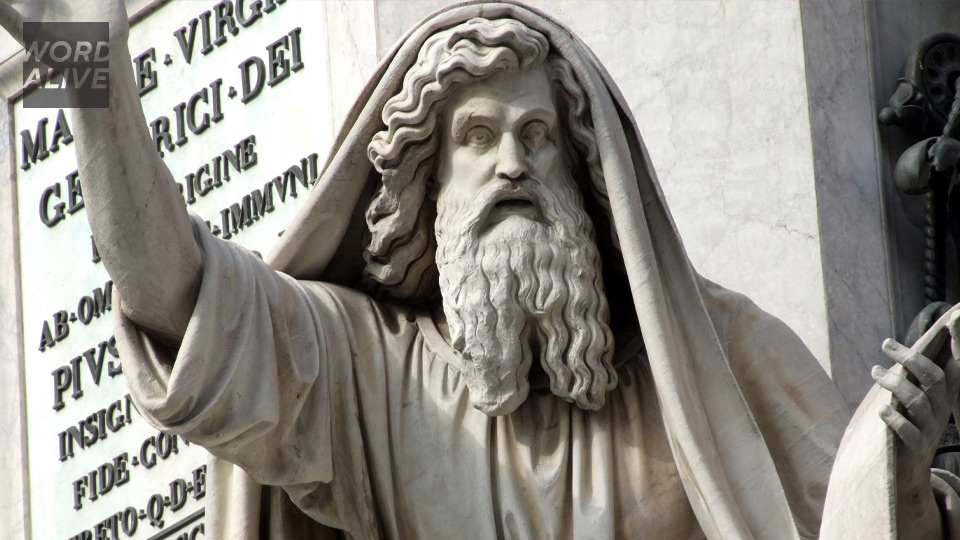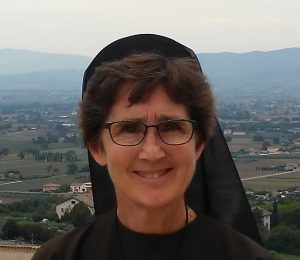



The call of the prophet | Word Alive
Sr. Damien Marie Savino, FSE
Friday, September 4, 2020

Statue of the Prophet Ezekiel by Carlo Chelli. Part of the Column of the Immaculate Conception in Piazza Mignanelli in Rome. (Photo credit: gnuckx)
The call of the prophet
A reflection for the Twenty-third Sunday in Ordinary Time, Year A
by Sr. Damien Marie Savino, FSE
What does it mean to be a prophet? In Hebrew, the term means “mouth” of God. It comes from a root word denoting hollowness or openness, suggesting that in order to be an effective mouthpiece or spokesperson for God, the prophet must be like a hollow vessel, open and receptive. The prophet is called to listen and be attentive to the Lord’s communications and then announce the Lord’s words to the people. The prophet is also called to be a sentinel, like a watchman at the city gate who is ready to warn the city’s inhabitants of impending danger. This Sunday’s Old Testament reading finds the Lord exhorting the prophet Ezekiel to be a spiritual watchman for the Israelites, who were living in exile in Babylon and had fallen into idolatry and belief in false prophecies. As the mouthpiece of God, Ezekiel is commanded to proclaim the Lord’s judgment on their sins and to exhort them to repentance. Not only that, but the Lord tells Ezekiel that if he does not speak out to dissuade the people from their sins, he himself will be responsible for their demise. On the other hand, if he does warn them and they still refuse to listen and convert, the Israelites will suffer from their guilt, but the prophet will save his own soul because he has been true to his sacred responsibility. What a demanding call for Ezekiel! We might hear this reading and think: Thank God I don’t have to do that! . . . That is, until we hear the Gospel and realize that we are called to do the same thing in our own day. As members of the new covenant, we are called to be prophets in today’s culture. We are called to be God’s mouthpiece, with the sacred responsibility to “call out” our brother or sister who sins. This does not come to us naturally in a culture marked by indifference, relativism, and individualism. Who am I to tell another person what to do? If they want to do that, it is up to them. Whatever. I can’t impose my beliefs on them. That is so judgmental. Am I my brother’s keeper?. . . These refrains are constantly in our ears. If we take this Sunday’s Gospel seriously, however, we realize that we are indeed called to this level of prophetic communal responsibility. In the 18th chapter of Matthew, the Lord gives us very practical advice on how to be sentinels to those who have strayed from the Gospel. First, approach the person one-on-one and express your concerns. If this does not resolve the issue, take the next step and seek the help of another friend or two. Only if both of these do not work do you bring the issue to the larger Church body. Is this easy to do? No. It takes great strength and love to engage in a healthy process of fraternal correction rather than retreating into a safe zone of non-conflict. And of course we cannot do this in every situation in which we have been wronged or perceive that sins have been committed. It requires prudence to discern when fraternal correction is merited and how best to speak into a situation. It also requires humility and the kind of love to which St. Paul calls us in the second reading to the Romans. If we are challenging another out of a kind of rigid adherence to the law, we might want to examine our own conscience to make sure we are speaking in love and with the reconciliation and good of the other person in mind. Am I demeaning the person in my attempt at fraternal correction? Or am I like an open vessel, grounded in Gospel values and willing to express concern if a person or persons seem to be choosing a direction that is harmful to them? We will never be perfect, but we must take the call to fraternal correction seriously. Fraternal correction, when flowing from love and not in a spirit of rigidity or bitterness, is a profound way of expressing love. It concerns me that we seem to be losing the capacity as a culture for both expressing and receiving fraternal correction. When only a narrow range of views are considered “acceptable” and there is little or no foundation of enduring truth, the ground in which open communication can occur shrinks, and along with it, the capacity for love. Fraternal correction is a healing medicine the Lord provides to assist us in staying on track. We need each other in order to live according to the challenging truth of the Gospel and to be honest to who we are as human persons created in the image of God. When we do this, the Lord will be there in our midst (Mt 18:20). As difficult as it has become in today’s culture, it should nevertheless give us pause to recall the Lord’s command to Ezekiel that if he did not speak out, he would held responsible for the sins of his people. The name “Ezekiel” means “God strengthens.” Perhaps during this COVID period when we are more confined, we could seize the opportunity to cultivate the inner strength needed to grow in our capacity for fraternal correction. Let’s practice being prophets.The readings for the Twenty-third Sunday in Ordinary Time, Year A, are Ezekiel 33:7-9 Romans 13:8-10 Matthew 18:15-20
 Sr. Damien Marie Savino, FSE, is a Franciscan Sister of the Eucharist currently serving as the Dean of Science and Sustainability at Aquinas College in Grand Rapids, Michigan. She has travelled across the United States, Canada, and Europe lecturing on Pope Francis’ encyclical Laudato Si’ and our Catholic responsibility to care for creation, as well as on various topics related to the integration of science and faith. Sr. Damien Marie earned her doctorate in Environmental Engineering from The Catholic University of America and also has advanced training in theology. She lives with her religious community on a 230 acre farm outside of Grand Rapids.
Sr. Damien Marie Savino, FSE, is a Franciscan Sister of the Eucharist currently serving as the Dean of Science and Sustainability at Aquinas College in Grand Rapids, Michigan. She has travelled across the United States, Canada, and Europe lecturing on Pope Francis’ encyclical Laudato Si’ and our Catholic responsibility to care for creation, as well as on various topics related to the integration of science and faith. Sr. Damien Marie earned her doctorate in Environmental Engineering from The Catholic University of America and also has advanced training in theology. She lives with her religious community on a 230 acre farm outside of Grand Rapids.

Click here for all articles in the Word Alive series
Related Articles:
<<
SUPPORT LABEL
$50
$100
$150
$250
OTHER AMOUNT
DONATE
Receive our newsletters
Stay Connected
Receive our newsletters

Stay Connected







